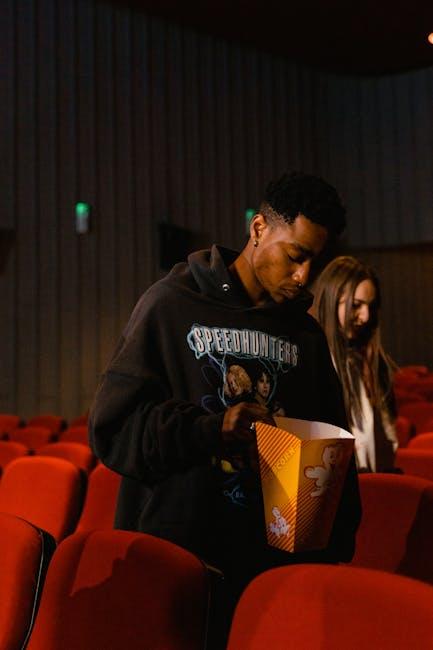In the ever-evolving tapestry of cinema, certain films stand as towering monuments, casting long shadows that influence generations of storytellers and captivate audiences worldwide. These cinematic masterpieces are not merely flickering images on a screen; they are the lifeblood of the art form, each frame a brushstroke on the vast canvas of human emotion and experience. For the discerning film enthusiast, understanding the language of cinema means immersing oneself in these seminal works, each offering a unique lens through which to explore the complexities of life, culture, and imagination. As we embark on this curated journey through the annals of film history, prepare to encounter narratives that challenge perceptions, performances that redefine acting, and directorial visions that transform the ordinary into the extraordinary. Welcome to the essential viewing list for every cinephile—a celebration of the must-watch movies that have indelibly shaped the cinematic landscape.
Cinematic Masterpieces That Shaped Film History
In the grand tapestry of cinema, certain films stand out as pivotal works that have redefined storytelling, influenced generations, and left an indelible mark on the industry. These are not just movies; they are cultural landmarks that have inspired countless filmmakers and continue to captivate audiences worldwide. Among these cinematic giants, we find:
- The Godfather (1972): A monumental exploration of power, family, and betrayal, Francis Ford Coppola’s magnum opus is a masterclass in narrative depth and character development.
- Citizen Kane (1941): Orson Welles’ groundbreaking film redefined visual storytelling with its innovative cinematography and complex narrative structure, setting new standards for filmmakers.
- Pulp Fiction (1994): Quentin Tarantino’s iconic non-linear narrative and razor-sharp dialogue have made this film a touchstone for modern cinema, blending dark humor with raw storytelling.
These masterpieces are more than mere entertainment; they are artistic achievements that challenge viewers to think critically about the world and their place in it. To truly appreciate the evolution of film, one must delve into these essential works, each offering a unique lens through which to view the human experience.
Unforgettable Performances and Iconic Roles
In the realm of cinema, certain performances transcend the screen, leaving an indelible mark on audiences and setting a benchmark for future generations. Marlon Brando’s portrayal of Don Vito Corleone in “The Godfather” remains a masterclass in character immersion, capturing the complexities of power and family loyalty with every nuanced expression. Audrey Hepburn, with her timeless elegance, brought to life the spirited and unforgettable Holly Golightly in “Breakfast at Tiffany’s”, a role that continues to inspire and enchant.
- Heath Ledger as the Joker in “The Dark Knight” delivered a chilling, transformative performance that redefined the superhero genre and showcased the actor’s immense talent and commitment.
- Meryl Streep in “Sophie’s Choice” portrayed a character so profoundly human and tragic, it remains a benchmark of emotional depth and acting prowess.
- Anthony Hopkins as Hannibal Lecter in “The Silence of the Lambs” created a villain so captivatingly sinister, he left audiences both terrified and mesmerized.
These performances not only defined careers but also shaped the cultural landscape of cinema, reminding us of the power of storytelling and the art of acting.
Directorial Brilliance and Groundbreaking Techniques
In the world of cinema, there are those rare moments when directors transcend traditional storytelling, ushering in new eras of visual and narrative innovation. These are the films that redefine the boundaries of filmmaking, captivating audiences with their bold and inventive approaches. Whether through revolutionary camera work, innovative special effects, or unconventional narrative structures, these directors have left an indelible mark on the art of cinema.
- Alfred Hitchcock’s suspenseful genius, particularly in movies like Psycho, which utilized groundbreaking editing techniques to create tension and horror.
- Stanley Kubrick and his meticulous attention to detail, evident in masterpieces such as 2001: A Space Odyssey, which pushed the boundaries of visual storytelling.
- Orson Welles with Citizen Kane, which introduced pioneering cinematography and narrative techniques that are still studied by filmmakers today.
- Christopher Nolan, who continues to challenge perceptions of time and reality in films like Inception, blending intricate storytelling with stunning visual effects.
Each of these directors has not only crafted unforgettable films but has also inspired countless others to explore and experiment, cementing their place in cinematic history. Their work is a testament to the power of innovation in filmmaking, offering lessons in creativity and vision that resonate across generations.
Cultural Impact and Timeless Storytelling
Throughout cinematic history, certain films have transcended their original release periods to become cultural touchstones, influencing not only the art of filmmaking but also the broader societal narrative. These films possess a timeless quality that continues to resonate with audiences across generations. Their storytelling techniques, rich character development, and profound thematic explorations have set benchmarks for what cinema can achieve, crafting a legacy that inspires both filmmakers and viewers alike.
- Citizen Kane (1941): Often hailed as the greatest film ever made, this masterpiece by Orson Welles revolutionized narrative structure and cinematography, leaving an indelible mark on storytelling techniques.
- Pulp Fiction (1994): Quentin Tarantino’s non-linear narrative and sharp dialogue have influenced countless films and filmmakers, making it a staple in the study of modern cinematic storytelling.
- Spirited Away (2001): Hayao Miyazaki’s animated epic blends fantasy with profound themes of identity and transformation, captivating audiences worldwide with its visual splendor and emotional depth.
These films are more than just entertainment; they are cultural artifacts that reflect and shape societal values, provoke thought, and ignite conversations. By exploring complex human emotions and societal issues, they remind us of the power of storytelling to both mirror and mold the human experience.



